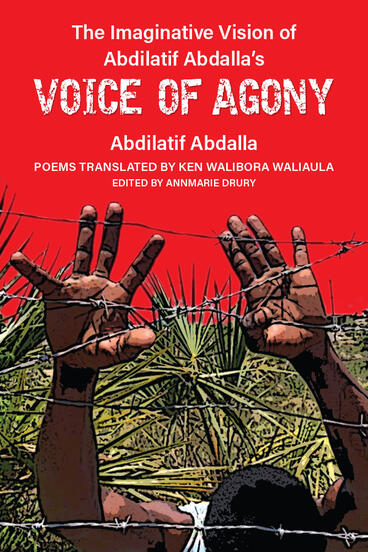The Imaginative Vision of Abdilatif Abdalla’s Voice of Agony
Poems Translated by Ken Walibora Waliaula
First English literary translation of Abdilatif Abadalla’s influential Voice of Agony
Description
The extraordinary Swahili poetry collection Sauti ya Dhiki (Voice of Agony) is a collection of prison poems composed by Abdilatif Abdalla between 1969 and 1972. He originally wrote the poems while incarcerated by the government of Jomo Kenyatta for sedition as a result of his political activism and smuggled them out of prison on scraps of paper. Imaginative Vision is the first complete literary translation into English—translated by the late Kenyan novelist and scholar Ken Walibora Waliaula and edited by Annmarie Drury—of one of the most esteemed and influential collections of Swahili poetry of the twentieth century.
Yet, Imaginative Vision is also something more. Even as it centers on a literary translation of a singularly beautiful and influential book of poetry, it tells English-language readers the story of that book. Supporting materials illuminate the circumstances of its inception when Abdilatif, aged 22, was arrested and tried. They explore what the volume meant to its first readers and its affiliations with subsequent extraordinary works of prison literature by Alamin Mazrui and Ngũgĩ wa Thiong’o. They trace its links to literary art of the past, including the nineteenth-century poet Muyaka bin Haji, and to writing that followed. And they explain social and historical aspects of the Swahili coastal world that nurtured Abdilatif’s political engagement and stunning verbal art. Under the editorship of scholar, translator, and poet Annmarie Drury, contributors bring insights from their diverse backgrounds to present contextualizing material that illuminates the poems at the heart of this book.
Abdilatif Abdalla is a celebrated Kenyan poet and political activist.
Annmarie Drury is Associate Professor of English, Queens College, City University of New York.
Reviews
“This important book finally presents us with a translation of the poetry anthology by the Swahili poet Abdilatif Abdalla, the first political prisoner of independent Kenya. Through the fine translations by Ken Walibora Waliaula and Annmarie Drury we can hear the ever-changing voices of his poetry. With rare expertise, Ngũgĩ wa Thiong’o and Alamin Mazrui, Ann Biersteker, Meg Arenberg and Kai Kresse offer a global readership a prism through which to explore the many ‘imaginative visions’, in which the sociopolitical and the lyrical are so deeply intertwined.”
- Clarissa Vierke, Universität Bayreuth
“The publication of an English translation of Abdilatif Abdalla’s Sauti ya Dhiki (Voice of Agony) will revolutionize our conception of African literature and its cultural politics. This book puts Swahili poetry at the center of debates about world literature and displays the capacity of translation to expand the boundaries of writing in African languages.”
- Simon Gikandi, Class of 1943 University Professor of English, Princeton University
“‘Listen’ – begins the first poem in this collection, and imperatives keep tolling throughout: ‘look’, ‘be tough’, ‘be fully alert’, ‘feel sorrow’, ‘be merciful’ and, above all, ‘speak up’. Writing from his prison cell, Abdilatif Abdalla conjures into being a community of readers – of listeners – where speech is free, critical, cunning, wry, and finally transformative. Thanks to this exemplary book of translation, anglophone readers can now hear his voice, and feel its challenge.”
- Matthew Reynolds, University of Oxford
"Prof. Drury has left an indelible mark in giving a voice to minority literature, particularly through translation. . . . by rendering Sauti ya Dhiki into English, Ken Wilibora expands the scope of readership of Abdilatif Abdalla's poetry beyond East Africa."
- Enock Matundura, Daily Nation
"The significance of Voice of Agony in preserving Abdilatif Abdalla’s legacy and advancing the study of East African literature and history cannot be overemphasised. It stands as an indispensable resource, showcasing the enduring power of poetry as a tool for resistance and emancipation."
- The Muslim News, Ahmed Rajab
News, Reviews, Interviews
Read: Review in The Muslim Times | March 1, 2024

